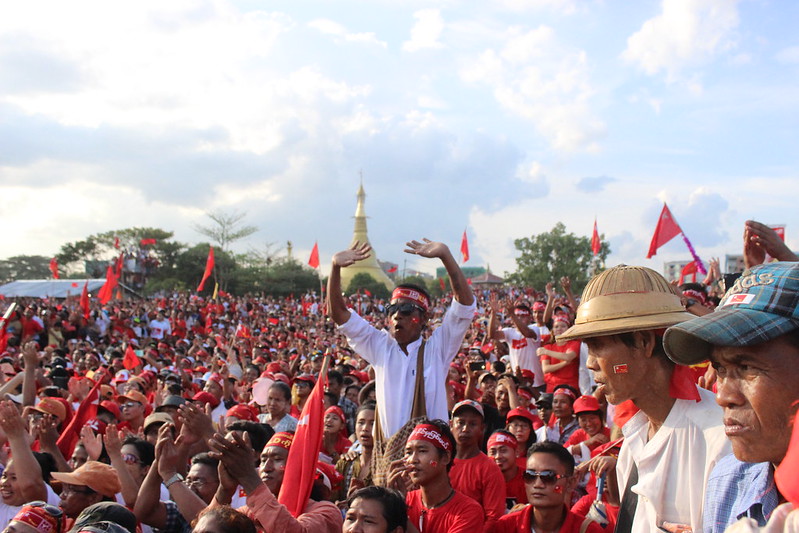
The red tsunami that swept NLD to historic landslide: a sea of red overflows open-air ground at Yangon’s Thuwunna Myo Oo Zedi pagoda as party supporters cheer leader Aung San Suu Kyi at pre-poll rally. (Photo: Ryan Rosauro)
The overwhelming win of the National League for Democracy (NLD) in Myanmar’s national election is a big boost to the country’s democratization with the press expected to play a constructive role in advancing the process.
Daily newspapers have mushroomed since the nominally civilian government which will remain in charge till April 2016, initiated partial political loosening in 2011. The opening up also brought back to the country, exiled Burmese journalists who were based in Thailand, Bangladesh and India.
Yangon now has 32 printed dailies, most of which also accessible online. Print and online media are the main channels of independent reporting in Myanmar. The military and the government has its own newspapers. Television and radio remain subject to tight state control despite the lifting of censorship in August 2012.
However, mainstream media in the country still does not adequately reflect the voice of the ethnic people who comprise 30% of Myanmar’s population.
“Ethnic voices are lacking in (the public discourse of) Burma,” said Nan Paw Gay, executive director of Burma News International (BNI), a network of 13 news organizations established in 2003 that is promoting ethnic voices in mainstream media.
Although each of the seven ethnic states has at least two news weeklies, many of these are printed in Yangon. BNI aggregates and distributes stories produced by member news organizations, among its network as well as to Yangon-based media.
During the 2015 election season, Myanmar’s media was focused solely on the standoff between the opposition parties led by the National League for Democracy (NLD) and the military-backed government as expected in a country in the throes of a democratic transition. Ethnic issues did not figure adequately in the Yangon press.
“We have to understand the context (to understand the focus of the media’s election coverage),” said Rast’o Kuzel of Democracy Reporting International (DRI), a Germany-based international organization assisting media development initiatives in Myanmar.
The media is seen as having a major role in helping increase the ethnic people’s understanding of national political development so they can participate fully in the democratization process.
Here, reach is an issue. According to Narinjara News Chief Editor Khaing Mrat Kyaw, “ordinary ethnic people are not readers but listeners. That is why radio is very important to make them understand the issues.” This need is affirmed by Paw Gay. BNI’s Paw Gay agrees: “Radio is very important because not many read or are schooled,” she explained.
Coverage of ethnic issues is slowly entering mainstream media based in Yangon. The English language daily Myanmar Times has shown interest in subscribing to the stories distributed by BNI. Some other Yangon papers are already carrying stories from the BNI network.
Other mainstream news organizations have cited BNI stories in their reporting of ethnic issues.
“Mainstream media is now beginning to recognize the need for them to cater to ethnic stories,” said Paw Gay. “(Even) People in government media (also) now understand that need but are just constrained by regulation.”
To increase the independent media space, news organizations are going online. The Democratic Voice of Burma (DVB) has pioneered online television while the Karen Information Center, which runs The Karen News, has started online radio broadcasts. But their reach is limited by Myanmar’s poor Internet reach, especially in the ethnic areas. Only between 9% to 12% of the country’s population have online access, according to DRI’s Kuzel. This is mostly in the Yangon-Naypyidaw-Mandalay corridor.
*) This article is produced for the 2015 Southeast Asian Press Alliance (SEAPA) fellowship program raising a theme “Covering the coverage of the 2015 elections in Myanmar.” Ryan Rosauro is a Filipino independent journalist writing news articles for several mainstream media in the Philippines.
Prachatai English is an independent, non-profit news outlet committed to covering underreported issues in Thailand, especially about democratization and human rights, despite pressure from the authorities. Your support will ensure that we stay a professional media source and be able to meet the challenges and deliver in-depth reporting.
• Simple steps to support Prachatai English
1. Bank transfer to account “โครงการหนังสือพิมพ์อินเทอร์เน็ต ประชาไท” or “Prachatai Online Newspaper” 091-0-21689-4, Krungthai Bank
2. Or, Transfer money via Paypal, to e-mail address: [email protected], please leave a comment on the transaction as “For Prachatai English”
